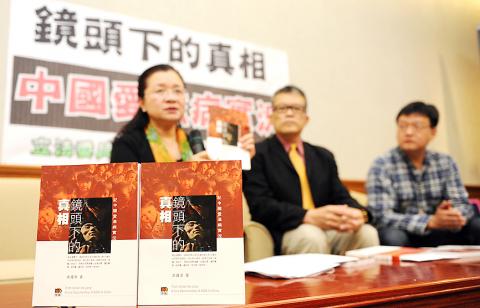Gao Yaojie (高耀潔), an exiled Chinese obstetrician who has dedicated herself to exposing the problem of HIV/AIDS caused by blood-selling in China, has published her fourth book on the health crisis and chose Taipei to hold the book launch yesterday.
Gao, who now lives in the US, first uncovered the problem of the so-called “plasma economy” and the tragedy it caused in China in the late 1990s.
During her investigation she found a large number of peasants from Henan Province were persuaded by local officials to sell their blood in the early 1980s.

Photo: Liu Hsin-de, Taipei Times
Due to a poor blood handling process, many were infected with HIV.
She worked hard to help the victims whose illness was denied government recognition and care and to publicize the scandal, actions which caused her to be placed under government surveillance and eventually driven out of China in 2009.
Truth Under the Lens: A Live Documentary of AIDS in China is a collection of photos, depicting the HIV patients’ lives and sufferings and making a powerful statement about the Chinese government led by Chinese Premier Li Keqiang (李克強), who at the time of the “plasma economy” served as Henan Province Communist Party secretary.
“The book is a testimony to my 17 years of dedicated work recording China’s HIV/AIDS epidemic. Every photo deals with an AIDS patient’s blood and tears; every picture would pain people with a noble heart,” Gao said in a video recording.
At 85 and afflicted with illness, Gao could not be present in person.
“Not one official has been held accountable for the epidemic. All they do is try to cover up its spread. I’ve always abhorred this kind of deed,” she said.
Democratic Progressive Party Legislator Tien Chiu-chin (田秋堇) said the Chinese government’s persecution of Gao was intended as a warning to others who dare to show interests in probing the matter.
“Not only did the Chinese authorities fail to help the victims, it also oppressed those who offered support to them,” Tien said.
Hugh Lin (林郁修), the chief executive of Harmony Home Foundation Taiwan, an organization that helps set up shelters in China for abandoned HIV-positive children, said many of the children they work with are denied the opportunity to attend school.
He added that since helathcare in China is restricted by household registration rules, many from the countryside, where healthcare is generally less developed, have to pay high prices if they choose to seek medical attention in the cities.
While the Chinese government’s evasive attitude has been castigated, Adam Lee (李志德), the Mandarin correspondent of Radio Free Asia, expressed his concern over the self-censorship of the Taiwanese media that is becoming more evident in the past few years.
“Reports about China on issues considered as sensitive are diminishing. China’s political influence in Taiwanese media is palpable and getting more serious,” Lee said.
“It’s been said that Mainland Affairs Council Minister Wang Yu-chi (王郁琦) is meeting up with the Taiwan Affairs Office director early next year to discuss the mutual establishment of representative offices and permanent offices for news agencies. I hope that Wang does not rush into signing any agreement with China concerning the press,” he said, adding that since many foreign news outlets are also experiencing China’s suppression, “it is a good opportunity for us to forge an alliance against China’s encroachment upon media freedom.”

Taipei and New Taipei City government officials are aiming to have the first phase of the Wanhua-Jungho-Shulin Mass Rapid Transit (MRT) line completed and opened by 2027, following the arrival of the first train set yesterday. The 22km-long Light Green Line would connect four densely populated districts in Taipei and New Taipei City: Wanhua (萬華), Jhonghe (中和), Tucheng (土城) and Shulin (樹林). The first phase of the project would connect Wanhua and Jhonghe districts, with Chiang Kai-shek Memorial Hall and Chukuang (莒光) being the terminal stations. The two municipalities jointly hosted a ceremony for the first train to be used

MILITARY AID: Taiwan has received a first batch of US long-range tactical missiles ahead of schedule, with a second shipment expected to be delivered by 2026 The US’ early delivery of long-range tactical ballistic missiles to Taiwan last month carries political and strategic significance, a military source said yesterday. According to the Ministry of National Defense’s budget report, the batch of military hardware from the US, including 11 sets of M142 High Mobility Artillery Rocket Systems (HIMARS) and 64 MGM-140 Army Tactical Missile Systems, had been scheduled to be delivered to Taiwan between the end of this year and the beginning of next year. However, the first batch arrived last month, earlier than scheduled, with the second batch —18 sets of HIMARS, 20 MGM-140 missiles and 864 M30

Representative to the US Alexander Yui delivered a letter from the government to US president-elect Donald Trump during a meeting with a former Trump administration official, CNN reported yesterday. Yui on Thursday met with former US national security adviser Robert O’Brien over a private lunch in Salt Lake City, Utah, with US Representative Chris Stewart, the Web site of the US cable news channel reported, citing three sources familiar with the matter. “During that lunch the letter was passed along, and then shared with Trump, two of the sources said,” CNN said. O’Brien declined to comment on the lunch, as did the Taipei

A woman who allegedly attacked a high-school student with a utility knife, injuring his face, on a Taipei metro train late on Friday has been transferred to prosecutors, police said yesterday. The incident occurred near MRT Xinpu Station at about 10:17pm on a Bannan Line train headed toward Dingpu, New Taipei City police said. Before police arrived at the station to arrest the suspect, a woman surnamed Wang (王) who is in her early 40s, she had already been subdued by four male passengers, one of whom was an off-duty Taipei police officer, police said. The student, 17, who sustained a cut about